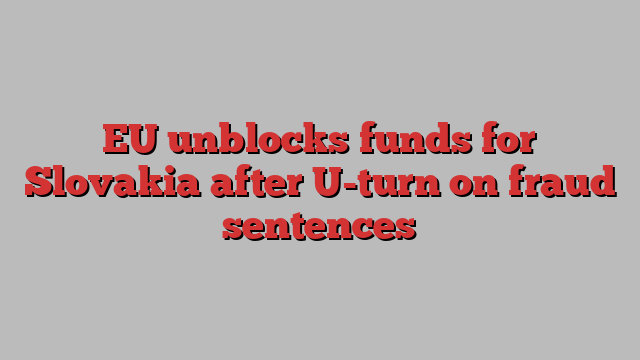
Unlock the Editor’s Digest for free
Roula Khalaf, Editor of the FT, selects her favourite stories in this weekly newsletter.
Brussels has cleared payment of EU funds for Slovakia that had been held up over concerns with the rule of law after Bratislava clarified that fraud with the bloc’s money would continue to be criminalised.
Brussels had cleared the €799mn disbursement of post-pandemic recovery funds after the government led by Robert Fico had reinstated sentencing for fraud with EU funds, but officials held up the transfer in July when Bratislava’s top court approved amendments to its criminal code.
The new code, which the opposition denounced, reduced sentences for crimes ranging from petty theft to fraud.
Fico’s government, however, has now reassured Brussels that the amendments do not eliminate the prosecution of crimes involving EU funds.
The European Commission said on Tuesday it had decided to release the funds after evaluating that the government complied with its criteria, including reforms meant to “fight corruption and strengthen integrity and independence of the justice system”.
“The amendments made by the Slovak parliament to the criminal code have partly alleviated some of the commission’s concerns,” and talks with Bratislava were still ongoing “to clarify the pending issues”, the commission said.
The opposition and the commission had previously accused Fico of trying to erode the rule of law by changing the code and shutting down two dedicated offices for fighting corruption and policing politicians’ abuse of power.
Peter Kmec, Slovakia’s minister in charge of EU funds, told local outlet Pravda that his government’s diplomatic efforts had managed to “convince” Brussels that the code amendments were “not against” EU rules.
The opposition claims the new code has been designed to protect Fico’s allies from prosecution by shortening the statute of limitations for past crimes.
Tomáš Taraba, deputy prime minister, told the Financial Times earlier this month that the reform was, in part, a response to “a huge mistake: the previous government really hunted our leaders without any solid evidence”.
Fico, a nationalist politician and ally of Hungary’s premier Viktor Orbán, is serving his fourth term after winning last year’s elections.
He survived an assassination attempt earlier this year and has vowed to oppose Ukraine’s Nato membership. While Brussels has frozen much of Hungary’s EU funds, it has refrained so far from similar action against Fico.